|
|
|
Sort Order |
|
|
|
Items / Page
|
|
|
|
|
|
|
| Srl | Item |
| 1 |
ID:
157608
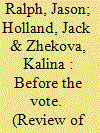

|
|
|
|
|
| Summary/Abstract |
The literature of recent UK policy toward Syria focuses on the 2013 chemical weapons crisis. We examine policy discourses leading up to that. The government supported the removal of Assad but faced the challenge of explaining how that would be realised. Given its unwillingness and inability to mobilise support for military intervention, or to tailor policy goals to match available means, government strategy arguably lacked credibility. Our purpose is to examine how the government tried to close this ends means gap and how, having failed to do that, its ‘discursive strategy’ legitimised its approach. We argue the resources for the government’s discursive strategy on Syria can be found in the earlier articulation of ‘liberal conservatism’. A policy that from an ideal-liberal or ideal-conservative position might have been criticised as half-baked was maintained by a strategy that gave consideration to, but did not completely follow through on, either archetype. Drawing on an analysis of 2,152 sources and supplemented by elite interviews, we illustrate how this strategy managed the interplay of two basic discourses: a liberal insistence that the UK should support ‘the Arab Spring’ and a conservative insistence that military intervention was imprudent because ‘Syria was not Libya’.
|
|
|
|
|
|
|
|
|
|
|
|
|
|
|
|
| 2 |
ID:
157612
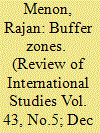

|
|
|
|
|
| Summary/Abstract |
Amidst calls for containing an assertive Russia, politicians and pundits have been debating whether Ukraine should serve as a ‘buffer zone’ between the Russian and Western spheres of influence. These debates provide an opportunity to revisit the long and varied history of major powers’ efforts to manage buffer zones. We draw on this history to learn the conditions under which buffer zones succeed or fail to stabilise regions, how buffers are most successfully managed, and when alternative arrangements for borderlands work better.
|
|
|
|
|
|
|
|
|
|
|
|
|
|
|
|
| 3 |
ID:
157605
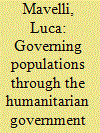

|
|
|
|
|
| Summary/Abstract |
The notion of humanitarian government has been increasingly employed to describe the simultaneous and conflicting deployment of humanitarianism and security in the government of ‘precarious lives’ such as refugees. This article argues that humanitarian government should also be understood as the biopolitical government of host populations through the humanitarian government of refugees. In particular, it explores how the biopolitical governmentality of the UK decision to suspend search-and-rescue operations in the Mediterranean in 2014, and the British rejection and German welcoming of Syrian refugees primarily concern the biological and emotional care of the British and German populations. To this end, the article analyses how dynamics of inclusion/exclusion of refugees have been informed by a biopolitical racism that redraws the boundary between ‘valuable’ (to be included) and ‘not valuable’ (to be excluded) lives according to the refugees’ capacity to enhance the biological and emotional well-being of host populations. This discussion aims to contribute to three interrelated fields of research – namely, humanitarian government, biopolitical governmentality, and responses to the European refugee crisis – by exploring how biopolitics has shaped the British and German responses to the crisis and how it encompasses more meanings and rationalities than currently recognised by existing scholarship on humanitarian government.
|
|
|
|
|
|
|
|
|
|
|
|
|
|
|
|
| 4 |
ID:
157611


|
|
|
|
|
| Summary/Abstract |
Why are some institutional designs perceived as more legitimate than others, and why is the same institutional design sometimes perceived as legitimacy-enhancing in one setting and not in another? In a world in which most international organisations (IOs) do not fully embody societal values and norms, such as democratic participation and equal treatment, why do legitimacy deficits in some organisations lead to pressure for institutional change while in others they are tolerated? These are important questions given that many analysts have diagnosed a ‘legitimacy crisis’ of IOs, but we argue that existing approaches are ill equipped to answer them. We show that the existing legitimacy literature has an implicit model of institutional change – the congruence model – but that this model has difficulty accounting for important patterns of change and non-change because it lacks microfoundations. We argue that attributions of legitimacy rest on perceptions and this implies the need to investigate the cognitive bases of legitimacy. We introduce a cognitive model of legitimacy and deduce a set of testable propositions to explain the conditions under which legitimacy judgments change and, in turn, produce pressures for institutional change in IOs.
|
|
|
|
|
|
|
|
|
|
|
|
|
|
|
|
| 5 |
ID:
157607
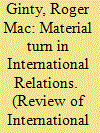

|
|
|
|
|
| Summary/Abstract |
This article explores how analysis of material objects offers insights into international intervention and reactions to that intervention. Building on studies that examine the 4x4 as emblematic of intervention, the article argues that the 4x4 can also be seen as an object of resistance and agency. To do so, it uses the case study of 4x4 usage in Darfur and draws on primary data including interviews and a UN security incident database. The article is mindful of the limitations of a ‘material turn’ in the study of International Relations, especially in relation to how it might encourage us to overlook agency and structural power. While finding new materialism arguments largely convincing, the case study encourages a note of caution and proposes the notion of ‘materialism+’, which allows for the further investigation of the human/non-human interface, but is circumspect about tendencies towards neophilia, dematerialism, and posthumanism.
|
|
|
|
|
|
|
|
|
|
|
|
|
|
|
|
| 6 |
ID:
157610
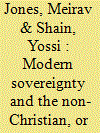

|
|
|
|
|
| Summary/Abstract |
This article participates in efforts by IR theorists to clarify aspects of modern sovereignty – an idea currently in rupture and being rethought – by returning to its founding ‘Westphalian moment’. While recent work has reconnected modern sovereignty to religion, considering Westphalia as a religious settlement and Christian concerns persisting in the groundwork of IR, our work looks beyond Christian concerns and asks how Westphalian sovereignty addressed non-Christians. We trace a yet-untapped discussion of the Jews – presented as a paradigmatic religious ‘other’ – among architects of Westphalian sovereignty from Bodin through Grotius, Hobbes, Harrington, and Spinoza. We demonstrate that foundational theorists of modern sovereignty considered religious diversity a political problem. Some cited essential sameness, minimising difference between Jews and Christians. Others considered the possibility of Jewish sovereignty long before this idea is usually considered to have entered modern consciousness. While the discussion of Jewish sovereignty among architects of modern sovereignty may seem to justify a Jewish state in a world of Westphalian states, it also emphasises Westphalia’s territorialising of religious difference. This aspect of the Westphalian framework is surely inadequate today, when territorialising religious difference is neither normative nor likely possible.
|
|
|
|
|
|
|
|
|
|
|
|
|
|
|
|
| 7 |
ID:
157609


|
|
|
|
|
| Summary/Abstract |
This article deals with the subject matter of International Relations as an academic discipline. It addresses the issue of whether and how one or many realms could legitimately be claimed as the discipline’s prime subject. It first raises a number of problems associated with both identifying the subject matter of IR and ‘labelling’ the discipline in relation to competing terms and disciplines, followed by a discussion on whether, and to what degree, IR takes its identity from a confluence of disciplinary traditions or from a distinct methodology. It then outlines two possibilities that would lead to identifying IR as a discipline defined by a specific realm in distinction to other disciplines: (1) the ‘international’ as a specific realm of the social world, functionally differentiated from other realms; (2) IR as being about everything in the social world above a particular scale. The final section discusses the implications of these views for the study of International Relations.
|
|
|
|
|
|
|
|
|
|
|
|
|
|
|
|
| 8 |
ID:
157604
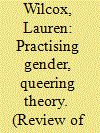

|
|
|
|
|
| Summary/Abstract |
The development of a ‘practice turn’ in International Relations promises to reconstitute IR theory around the study of embodied practices. Despite occasional references to Judith Butler’s work, the contributions of feminist and queer theory are under recognised in existing work. In this piece I note the distinctive approach to gender as a practice represented by Butler and other feminist/queer theorists for its emphasis on intelligibility and failure, particularly the importance on ‘competently’ practising gender in order to established as an intelligible subject. Given the centrality of ‘competency’ in ‘practice turn’ literature, theorising practice from the perspective of ‘gender failures’ sheds light on the embedded exclusions within this literature. To demonstrate the stakes of this critique, I discuss airport security practices, a growing area of interest to IR scholars, in terms of the experiences of trans- and gender non-conforming people. I argue that such practices ultimately complicate success/failure binaries. I conclude by considering the political stakes of practising theory in IR and how competency in theory is similarly marked by the exclusion of feminist/queer work.
|
|
|
|
|
|
|
|
|
|
|
|
|
|
|
|
| 9 |
ID:
157606


|
|
|
|
|
| Summary/Abstract |
The popularity of Foucauldian understandings of government in International Relations (IR) has led to a vibrant debate over the utility of Foucault’s work for the discipline, especially over its applicability outside Western liberal societies. By concentrating on governmentality’s international applicability, however, IR scholarship has neglected Foucault’s account of the foundations of modern social mentalities, apparatuses, and techniques. Foucault frequently based his ideas on historical research, with warfare and military affairs featuring prominently in his accounts of discipline and governmentality.
Based on a problematisation of the military aspects of Foucault’s thought, this article challenges Foucauldian IR scholarship to revisit governmentality’s foundations and reconsider the contemporary relevance of Foucault’s account of government. Foucault neglected the heterogeneity of European militaries, such as their reliance on impermanent, auxiliary, and non-Western forces. He thereby missed the opportunity to develop a more sophisticated account of the relationship between force, the military, government, discipline, and biopolitics. Moreover, this article challengesFoucauldian IR scholarship to revisit the empirical foundations of Foucault’s work and reconsider the geographical and temporal extent of the relevance of Foucault’s account of government as a result.
|
|
|
|
|
|
|
|
|
|
|
|
|
|
|
|
|
|
|
|
|